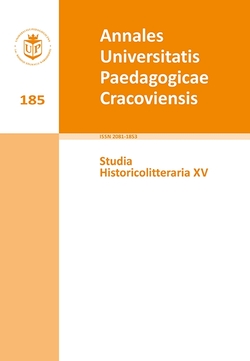Некоторые особенности универсального пространства войны в романе Олега Ермакова „Знак зверя”
Main Article Content
Abstrakt
Universal space of war in Oleg Yermakov's Sign of the beast
In his clearly pacifistic and anti-war book, a contemporary Russian writer Oleg Yermakov projects such an image of war which at a mythological level could be compared to the vision of hell. The main topic of the book is signalled through its title and motto, taken from the Book of Revelation (14:11): “And the smoke of their torment will rise for ever and ever. There will be no rest day or night for those who worship the beast and its image”.
The beast found in the novel is a personification of war, which in the writer’s view is unhuman and pointless. By combining in his writing visual and acoustic effects, as well as by making use of biblical symbols, Yermakov creates a universal space of evil. The space mentioned is composed of ideas of emptiness, ideological void, world without God, death, recurrence of phenomena which bears the signs of eternity, endlessness. The universal nature of the problem discussed was signalled through setting the plot in unspecified space and time. Anonymity and typicality are the dominant features. The writer is concerned with human reaction to evil, degradation of personality of one consciously taking part in war, the notion of complicity, and responsibility for one’s actions.
Key words: Oleg Jermakow; Sign of the beast; space; war; evil; biblical symbols;
Downloads
Article Details

Utwór dostępny jest na licencji Creative Commons Uznanie autorstwa – Użycie niekomercyjne – Bez utworów zależnych 4.0 Międzynarodowe.
POLITYKA PRAW AUTORSKICH
Wydawca „Annales Universitatis Paedagogicae Cracoviensis. Studia Historicolitteraria” jest upoważniony do korzystania oraz do rozpowszechniana wszystkich opublikowanych w czasopiśmie materiałów na podstawie umowy licencji niewyłącznej, zawartej uprzednio na czas nieoznaczony każdorazowo z autorem/ką konkretnego utworu na określonych w tamtejszej umowie polach eksploatacji.
POLITYKA OTWARTEGO DOSTĘPU
„Annales Universitatis Paedagogicae Cracoviensis. Studia Historicolitteraria” to czasopismo o otwartym dostępie, a cała jego zawartość jest dostępna bezpłatnie dla użytkowników i instytucji na zasadach licencji niewyłącznej CreativeCommons (CC BY-NC-ND 4.0). Użytkownicy/ki mogą czytać, pobierać, wykonywać kopie, rozpowszechniać, drukować, wyszukiwać lub linkować do pełnych tekstów artykułów w tym czasopiśmie bez uprzedniej zgody wydawcy lub autora/ki pod warunkiem podania źródła dostępu i autorstwa danej publikacji. Jest to zgodne z definicją otwartego dostępu BOAI (http://www.soros.org/openaccess).
Bibliografia
Глизнуца В., Символика цвета в романе Ф.М. Достоевского Преступление и наказание, http://www.nsportal.ru.
Гутрина Л., Парамонова Л., „Огневой горизонт” Петербурга: цветовая символика А. Белого, „Филологический класс” 2013, № 2(32).
Дербина Г., Тайна желтого букета Маргариты, http://www.litsovet.ru.
Ключинская О., Военная проза О.Н. Ермакова: проблематика жанрово-стилевого единства. Автореферат диссертации на соискание ученой степени кандидата филологических наук, Владивосток 2010.
Ключинская О., Проблемно-тематические аспекты современной военной прозы, „Гуманитарные исследования в Восточной Сибири и на Дальнем Востоке” 2010, № 4.
Магические символы: Солнце, [в:] Объекты и явления природы, http://www.magicysm.ru.
Nocuń M., Brzezicki A., Sieroty po imperium, „Tygodnik Powszechny” 15.12.2009, http://www.tygodnik.onet.pl.
Пустовая В., Человек с ружьем: смертник, бунтарь, писатель: о молодой военной прозе, „Новый мир” 2005, № 5.
Sałajczykowa J., „Afgańska” proza Olega Jermakowa, „Przegląd Humanistyczny” 1998, № 1(346).
Символы, знаки, эмблемы, http://www.slovari.yandex.ru.
Табатадзе Х., Мифологема провинционального города в романе Ф. Сологуба Мелкий бес, http://www.dspace.nbuv.gov.ua.
